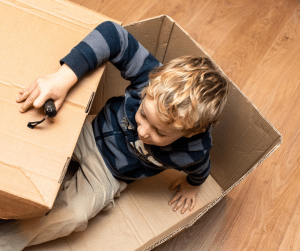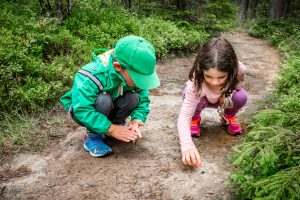Prioritising Play when Schools Reopen
In this blog John McMullen reflects on his lockdown experiences as a parent and his hopes for playful learning as schools re-open, making links to relevant research. Glenda Walsh concludes with some practical ideas for how we can prioritise and promote play post-lockdown.
Dr John McMullen is an Educational and Child Psychologist, and Senior Lecturer at Stranmillis University College.
Dr Glenda Walsh is Assistant Director of CREU, Head of Early Years Education and Principal Lecturer at Stranmillis University College.

The last CREU blog considered the positive experiences of some children and families during lockdown. Whilst not negating the severe challenges for many, this was a welcome, hopeful piece. When asked about hope in a recent podcast, the words of Howard Zinn came to mind: ‘If we see only the worst, it destroys our capacity to do something. If we remember those times and places – and there are so many – where people have behaved magnificently, this gives us the energy to act, and at least the possibility of sending this spinning top of a world in a different direction.’
I’ve been inspired by the creativity, support and fun emanating from many teachers, parents and carers during lockdown. Much of this innovation would not have occurred without the adversity of a pandemic, and the most hopeful aspects appear to centre around play. Children have spent more time playing, and the adults appear to have become more playful too, including dads! During lockdown fathers have nearly doubled the time they spend on childcare. While it’s still less than mothers do overall, this is important. Recent research tells us that father-infant play, often in the form of physical play such as rough and tumble, is linked to positive social, emotional and cognitive outcomes.
Playing with my daughter has been the sunshine through the grey clouds of COVID-19. The closing of childcare put pressure on work life but provided, and necessitated, more play in family life. We’ve enjoyed camping trips, lighting fires, Lego, building rockets, exploring woods and rivers, eating fruit that we grew, and catching bugs. Caring for children can be demanding, but when we allow ourselves to see the world through a child’s eyes, in their adventure and their wonder, playfulness can benefit our well-being as much as theirs. As schools start back it feels like it has never been more important to prioritise play.
“We don’t stop playing because we grow old; We grow old because we stop playing.”
George Bernard Shaw
The Importance of Play
Regardless of a child’s situation, learning through play is crucial for development. Playing helps children to be happy and healthy in their lives today, but also to develop the skills to be the creative, engaged learners of tomorrow. Play experiences can support the development of early literacy and numeracy skills in an integrated manner, while also cultivating children’s social, emotional, physical, and creative skills. Through play children also develop executive functioning, language, and a sense of agency, which are pre-requisites for success in school.
Learning through play is sometimes associated solely with preschool and viewed as purely child-directed and unstructured. However there is a growing evidence base for the importance of playful experiences throughout school and in life-long learning. Pedagogical approaches including active learning, collaborative and cooperative learning, problem-solving and project work are highly relevant to learning through play beyond the early years of schooling. Play may be important in helping children of all ages to move beyond the learning of key content and facts, to a deeper conceptual understanding that allows them to apply their knowledge to different situations, spark new ideas, step into uncertainty, create opportunities for themselves and their communities, and learn throughout life.
The Problem with Play
Despite near universal consensus on the importance of play, research has identified obstacles in practice such as appropriate provision, adults’ roles, parental expectations, top-down pressures, and a perceived dichotomy between play and work. Where teachers do not have confidence and competence in translating quality playful approaches into practice, it follows that not all children will have access to play, let alone good quality play, in their educational setting. This situation could potentially worsen in the wake of the COVID-19 pandemic as teachers are asked to prioritise ‘catching up’ on academic learning.
We caution against a dichotomous mindset. We argue for a more expansive understanding of play as learning in practice, where all aspects of children’s learning – personal, social, and academic can be fully enhanced and where playing, learning and teaching become fully synchronised. Perhaps if we see play as ‘the highest form of research’ as Einstein (may have) stated, it will embolden the community around each child to provide consistent, high quality, playful learning experiences.
The Impact of COVID-19
Not all children will have enjoyed playful experiences during lockdown. Almost all will have spent less time playing with children outside of their own family, i.e. their peer group. We do not know the long-term impact, if any, that widespread social isolation will have on their wellbeing. However, some insight is offered by a recent rapid systematic review of 80 studies, published from 1946-2020, of the impact of social isolation and loneliness on the mental health of children and adolescents. This suggested that social isolation and loneliness increase the risk of depression and anxiety in children, and that duration of loneliness was more strongly correlated with mental health symptoms than intensity of loneliness. The authors concluded that there is likely to be high rates of depression and probably anxiety during and after social isolation ends. As a response, a number of mental health experts have urged the government to prioritise children’s play, socialising and emotional wellbeing over formal lessons and academic progress when schools reopen. This was supported and emphasised in the Department of Education NI guidance sent to all schools in June 2020.
How to Prioritise and Promote Play Post-Lockdown
The Lego Foundation have identified five essential characteristics of playful learning, namely joy, meaning, active engagement, social interaction, and iteration. Practical suggestions for facilitating these rich playful learning experiences were highlighted in a previous blog. For example, through child in playful bubbles wearing the same coloured wrist band, discouraging as far as possible children interacting in bubbles beyond that of their own in an effort to maintain a form of social distancing between groups. In addition, instead of making use of commercial play resources which may require deep cleaning on a daily basis, the time is ripe to make greater use of junk play materials such as cardboard boxes, rope, string, polystyrene, plastic bottles, and containers to name but a few, and an array of natural resources including bark, seeds, sand, mud, stones, pebbles, leaves, twigs and straw, all of which can be easily replaced on a daily basis. Indeed, as the risk of infection from Covid-19 is less prevalent in the outdoors, according to the scientific evidence, it seems only fitting to make greater use of the outdoors and in so doing provide a range of playful experience that are filled with many possibilities and adventure. Outdoors, children can engage in a variety of playful experiences in their bubble, whether it be building dens, climbing trees, exploring wildlife, gardening, playing in mud kitchens, engaging in STEM activities with water and sand, undertaking a range of physical exercises or simply having fun with their peers.

At present we are only too aware that further lockdowns might be re-introduced and if this happens to be the case, it’s vital that a playful pedagogy continues. Dr. Bo Stjerne Thomsen provides some useful ideas from a school in Denmark for transitioning to distance learning using playful pedagogies. In recent months during the lockdown experience in Northern Ireland it has similarly been encouraging to see the excellent response of the Education sector in advocating a playful approach to teaching and learning in the home (e.g. https://www.stran.ac.uk/ideas-for-active-minds/).
Perhaps the way forward lies in extending these home-learning ideas practised during lockdown, by introducing a somewhat playful approach to homework tasks. As parents, we know only too well the challenge it is to get young children to complete sedentary worksheets at home, already tired after a long school day and by so doing, frequently denying them that precious time to engage in more play-based activities at home and outside. As schools begin to re-open after lockdown, we suggest that not only is it a priority to foster a playful approach to teaching and learning in our classrooms but a more playful approach might also be infused into homework tasks in general.
“Play with me Daddy!”
My 3-year-old doesn’t know it yet, but this is an invitation to join her, not only in fun and adventure, but in the highest form of research; in her wonder and questioning; in her cognitive, social, emotional and physical development; and in building life skills she will need now and after this pandemic. What a privilege for parents and teachers alike.
Reasons to study at Stranmillis
Student Satisfaction
Stranmillis is ranked first in Northern Ireland for student satisfaction.
Work-based placements
100% of our undergraduate students undertake an extensive programme of work-based placements.
Study Abroad
All students have the opportunity to spend time studying abroad.
Student Success
We are proud to have a 96% student success rate.
